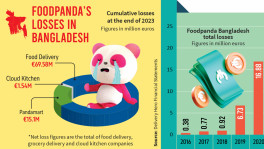Offbeat movies caught eyes amid downward spiral
Of the trends making of several offbeat movies, Hoichoi's penetration of the local market, Netflix's enhanced user experience and more participation of Indian actors in Bangladeshi films are noteworthy.

This year has witnessed many new trends in the film industry of Bangladesh. Of them, making of several offbeat movies, Hoichoi's penetration of the local market, Netflix's enhanced user experience since BTRC permitted licensed National Internet Exchange (NIX) operators to place cache servers for Netflix, and more participation of Indian actors in Bangladeshi films are noteworthy.
Offbeat films like Made in Bangladesh, Maya or The Lost Mother, Life in Rainbow, Fagun Haway and No Dorai have drawn the attention of movie lovers in the country.
Watch the trailer of 'Fagun Haway' here
The year started with a romantic movie titled Fagun Haway, which portrays the love between two teenagers during the Language Movement in 1952. Shakib Khan's action-comedy Nolok, which was released during Eid-ul-Fitr in June, turned out to be a good hit. As many as 80 cinema halls screened the movie.
The year ended with the offbeat movie No Dorai, which depicts the life of a female Bengali surfer chained by social norms. Despite controversy and censorship issues, this movie made its way to the screens and ended up being a good watch.
Watch the trailer of 'No Dorai' here
This film is the first production of Star Cineplex, which has also released a comic book and an animated video based on the story of No Dorai. Cartoon People made the comic book and the video titled No Dorai: Adventure of Ayesha.
According to the Bangladesh Film Producers and Distributors Association, 57 films including both, commercial and alternative film were released in the year. Of them, two were joint venture films. The number of movies imported from India under SAFTA was 10. Among the released movies, 45 were locally produced. Only 45 films were released in 12 months.
This is the year-round picture of Dhaka filmdom. So, it can be said that with the passing of years the quality of Dhaka film industry has been falling. Coupled with that is decreasing the number of movie halls.
There is no dependable box office data on films produced in Dhaka. So, it is difficult to know exactly which film did how much business or how much loss did
it make. Talking with several leaders of the booking agents, producers' associations, and exhibitor's association, it has been learnt that only one out of 47 films could do good business this year. They said the remaining films could not get the investment returned let alone doing profit.
The audience of Bangladeshi movies is slowly moving away from conventional platforms for watching films. Movie lovers get to enjoy better user experience on streaming sites like Hoichoi, Netflix, Amazon Prime, etc. In a sense, it is decreasing the demand for cinemas.
It is not new for Bangladeshi actors to appear in Indian films and for Indian actors to work in Bangladeshi films, but the number of Indian actors working in Bangladeshi movies has increased gradually.
Rituparna Sengupta acted in Noim Imtiaz Neyamul's film 'Jam' and 'Gaangchil' this year. Srabanti Chatterjee is working on her second Bangladeshi film 'Bikkhob.' Subhashree Kar is also stepping into the Bangladeshi film industry through this movie.
On the other hand, Bangladeshi actress Meghla Mukta got a big break in the Telegu film 'Sakala Kala Vallabhudu' this year. Previously known as a ramp model, Meghla tried to get lead roles in some Indian Bengali films, but could not do so. Then she auditioned for a Tamil film in 2017 and got selected for the lead role. Meghla then got an offer for a Telegu film this year. She plans to stick to the Indian film industry as long as possible.
Eleven Bangladeshi films were screened at the International Film Festival of India, named Film Bazaar, in Goa this year. Meanwhile, for the first time, Sri Lanka's national television aired a Bangladeshi movie titled Matir Projar Deshe on December 15 this year to pay tribute to Bangladesh's Independence and Language Movement. In fact, Sri Lankan national television screened the movie with subtitles in the Sinhalese language at its own cost.
The government of Bangladesh approved a budget of Tk322 crore this year to develop the Bangladesh Film Development Corporation (BFDC).
The BFDC also has plans to provide long-term loans at minimal interest to construct new cinema halls and to modernise old ones.


 Keep updated, follow The Business Standard's Google news channel
Keep updated, follow The Business Standard's Google news channel
















